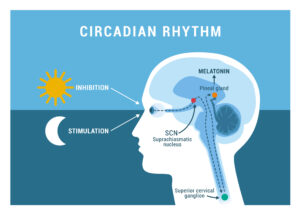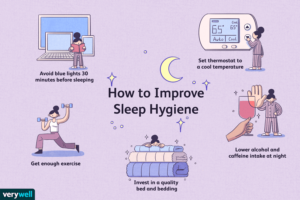Introduction:
Dive into the fascinating science of sleep and learn the secrets to getting your best night’s rest. A good night’s sleep is the foundation of a healthy and productive life. Yet, in today’s fast-paced world, many of us struggle to achieve the quality sleep our bodies and minds crave. Thankfully, understanding the science behind sleep can unlock the secrets to getting your best night’s rest. In this article, we’ll explore the fascinating world of sleep, delve into the factors affecting our sleep quality, and provide practical tips to optimize your sleep routine.
1. The Importance of Sleep:

Sleep is not merely a state of rest; it is a complex process vital for our overall well-being. While we sleep, our bodies engage in critical tasks such as tissue repair, hormone regulation, and memory consolidation. Adequate sleep has been linked to improved cognitive function, mood regulation, immune system support, and even weight management. Understanding the significance of sleep sets the stage for implementing effective strategies to optimize your sleep routine.
2. The Science of Sleep:

Sleep is regulated by our internal body clock, known as the circadian rhythm. This intricate system is influenced by external cues, such as light exposure, and helps us maintain a consistent sleep-wake cycle.
The Impact of Disrupted Circadian Rhythm
Disruptions to the circadian rhythm can wreak havoc on our sleep patterns and overall well-being. Irregular sleep schedules, such as constantly shifting work shifts or frequent jet lag from long-distance travel, can throw off the body’s natural sleep-wake cycle. Moreover, exposure to artificial light at night, particularly from electronic devices like smartphones and tablets, can suppress melatonin production, making it harder to fall asleep and compromising sleep quality.
3. Factors Affecting Sleep Quality:

The quality of our sleep can be influenced by various factors. Explore the interactive description below to understand these factors:
- Stress and Anxiety: High levels of stress and anxiety can make it difficult to fall asleep and stay asleep throughout the night. Practice relaxation techniques, such as deep breathing or meditation, to alleviate stress before bedtime.
- Medical Conditions: Certain medical conditions, such as insomnia or sleep apnea, can significantly impact sleep quality. If you suspect you have a sleep disorder, consult a healthcare professional for proper diagnosis and treatment.
- Lifestyle Choices: Lifestyle choices can also affect sleep. Caffeine consumption, especially close to bedtime, can interfere with falling asleep. Establish a cut-off time for caffeine intake to ensure it doesn’t disrupt your sleep.
- Irregular Sleep Schedules: Inconsistent sleep schedules, such as frequently changing work shifts or staying up late on weekends, can disrupt your body’s natural sleep-wake cycle. Strive for a consistent sleep schedule to promote better sleep quality.
- Electronic Devices: The blue light emitted by electronic devices, such as smartphones, tablets, and televisions, can suppress melatonin production, making it harder to fall asleep. Limit screen time before bed or use blue-light-blocking filters or apps.
- Sleep Environment: Your sleep environment plays a vital role in sleep quality. Ensure your bedroom is cool, dark, and quiet. Consider using earplugs, blackout curtains, or white noise machines to create a conducive environment for sleep.
- Physical Activity: Regular physical activity can contribute to better sleep quality. Engage in moderate exercise during the day, but avoid intense workouts close to bedtime, as they can be stimulating and make it harder to fall asleep.
- Nutrition and Hydration: Eating heavy meals, especially late at night, can disrupt sleep. Opt for light, balanced meals in the evening, and avoid consuming large amounts of fluids close to bedtime to prevent sleep disturbances.
By being aware of these factors and making conscious adjustments to your lifestyle and sleep environment, you can significantly improve the quality of your sleep and wake up feeling refreshed and rejuvenated.
4. Practical Tips for a Restful Night’s Sleep:

a. Establish a consistent sleep schedule: Go to bed and wake up at the same time every day, even on weekends, to reinforce your body’s natural sleep-wake cycle.
b. Create a soothing sleep environment: Optimize your bedroom for sleep by keeping it cool, dark, and quiet. Consider investing in comfortable bedding and minimizing electronic distractions.
c. Unwind before bed: Engage in relaxing activities before sleep, such as reading a book, practicing deep breathing exercises, or taking a warm bath. This signals to your body that it’s time to wind down.
d. Limit caffeine and alcohol: Avoid consuming stimulants like caffeine close to bedtime and be aware that alcohol can disrupt sleep patterns.
e. Establish a bedtime routine: Develop a consistent pre-sleep routine that cues your body for sleep, such as dimming the lights, listening to calming music, or practicing mindfulness meditation.
f. Manage stress: Incorporate stress management techniques into your daily routine, such as regular exercise, journaling, or talking to a trusted friend or professional.
Conclusion:

In the quest for optimal health and well-being, never underestimate the power of a good night’s sleep. By understanding the science behind sleep and implementing practical strategies, you can improve your sleep quality and reap the numerous benefits that come with it. So, prioritize your sleep, take steps to create a sleep-friendly environment, and establish healthy sleep habits. Embrace the science of sleep, and you’ll be well on your way to experiencing your best night’s rest and waking up ready to conquer each day.








